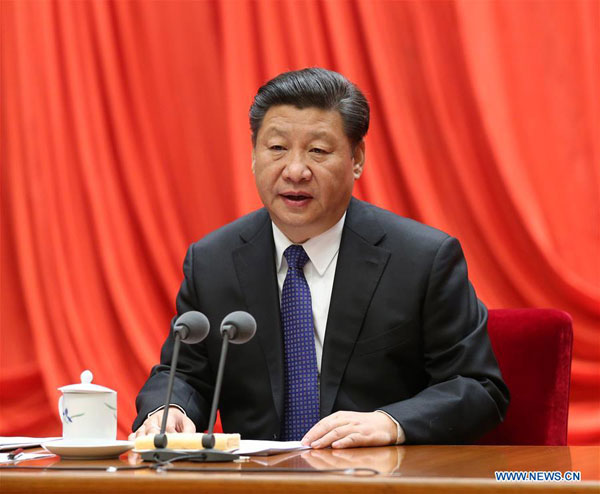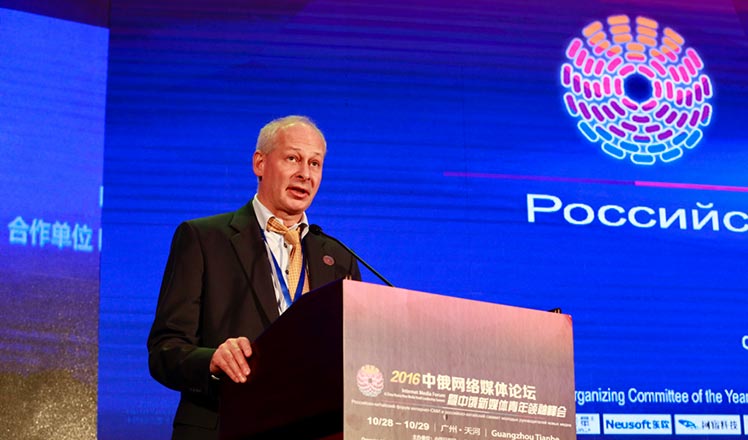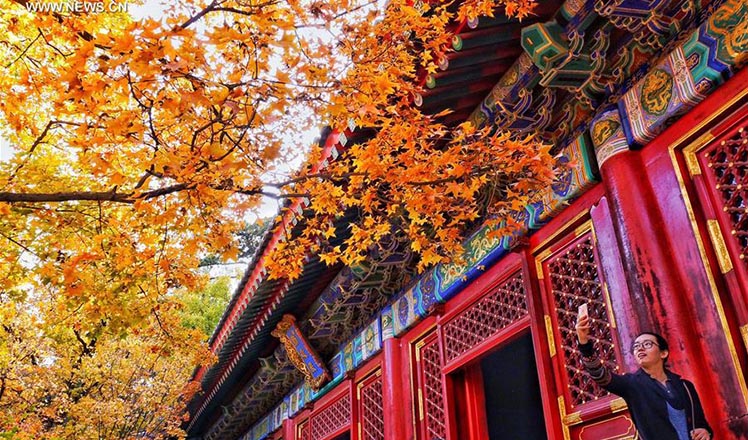A fact that Party leaders have endorsed
Updated: 2016-10-31 08:11
By Swaran Singh(China Daily)
|
||||||||
 |
|
Chinese President Xi Jinping, also general secretary of the Communist Party of China (CPC) Central Committee and chairman of the Central Military Commission, addresses the 6th plenary session of the 18th CPC Central Commission for Discipline Inspection (CCDI) in Beijing, Jan 12, 2016. [Photo/Xinhua] |
Ever since he became the general secretary of the Communist Party of China in November 2012, the world has been watching Xi Jinping for his robust anti-corruption campaign and his tough foreign and security policies. Many compare him with late Chinese leader Deng Xiaoping and Chairman Mao Zedong.

Party cadres have been increasingly pronounced in demanding unwavering loyalty to the Party with Xi as the "core", because he navigates through China's challenges that flow not just from the country's unprecedented rise but also from its increasingly complicated external conditions.
The Sixth Plenum of the 18th CPC Central Committee, therefore, only officially endorsed what has been China's "new normal" for most China-watchers.
Deng introduced the concept of "core" leader in 1989 when Jiang Zemin was selected Party chief. And Jiang laid the foundation of collective leadership norms that was further reinforced by his successor Hu Jintao.
The Sixth Plenum does underscore the value of "collective leadership", yet it calls on all Party members to "closely unite around the Party's Central Committee with Xi Jinping as the core".
Prima facie, the "core" honor appears to be a "coronation". But in addition to the singular authority Xi has enjoyed for four years, the new honor implies he will have far more to answer given his increased responsibility to arrest China's ongoing economic drift which, in turn, could trigger social rifts.
On the positive side, however, stronger leadership will make Xi's policies and moves more predictable, making it easier for other countries to build partnerships with China. And a stronger Xi will be able to better implement his Belt and Road Initiative and ensure his policies have a far-reaching impact in China.
In terms of regional and global geopolitics, the rise of a stronger Xi would be conducive to the resurgence of Asia and give a moral boost to dwindling groupings of emerging economies such as BRICS (Brazil, Russia, India, China and South Africa) and BASIC (BRICS minus Russia) that are seeking greater say and space in the new global governance mechanisms like the G20 and the much fatigued Bretton Woods institutions.
In the end, however, like his grand Belt and Road vision, the "core" honor for Xi will be dissected for its nuanced Chinese characteristics that leave a lot to interpretations and the developments in the coming years.
The author is a professor at the School of International Studies in Jawaharlal Nehru University, New Delhi.
- China's development, stability require strong core leadership: commentary
- Strong leadership core to build stronger nation
- Party members called on to unite around CPC Central Committee with Xi as 'core'
- 12 keywords of the Communique of the Sixth Plenary Session
- Key points of the communique after the Sixth Plenary Session
- Infographic: Top agendas of all 'Sixth Plenary Sessions'
- Facts about the 6th plenary session of the 18th CPC Central Committee
- What to expect from CPC's upcoming plenary session?
- Hefty award offered for deciphering oracle bone characters
- China Daily brings you 'sixth plenums' in past 35 years
- Party ramps up supervision
- 400,000 migrant workers flock to Xinjiang to harvest cotton
- China anticipates booming job market in 2016
- Online shopping platform selects cat as 'chief cute officer'
- Asia American leaders discuss civic engagement
- World's disabled get new champion
- Clinton, Michelle Obama make first joint campaign appearance
- Miss Philippines wins 2016 Miss International Beauty Pageant
- Trump's Hollywood Walk of Fame star destroyed
- Maduro activates Defense Council to seek solution to crisis

 China-Russia Internet Media Forum opens in Guangzhou
China-Russia Internet Media Forum opens in Guangzhou
 2016 Comedy Wildlife Photography Awards Finalists
2016 Comedy Wildlife Photography Awards Finalists
 NINED VR creates splash with virtual reality products
NINED VR creates splash with virtual reality products
 Splendid Sichuan captured in photos
Splendid Sichuan captured in photos
 Chinese baozi shop gains popularity in Harvard Square
Chinese baozi shop gains popularity in Harvard Square
 Chinese mariner on record-breaking voyage goes missing
Chinese mariner on record-breaking voyage goes missing
 2045-square-meter photo mosaic breaks world record
2045-square-meter photo mosaic breaks world record
 Red leaves reveal beauty of autumn
Red leaves reveal beauty of autumn
Most Viewed
Editor's Picks

|

|

|

|

|

|
Today's Top News
'Zero Hunger Run' held in Rome
Trump outlines anti-terror plan, proposing extreme vetting for immigrants
Phelps puts spotlight on cupping
US launches airstrikes against IS targets in Libya's Sirte
Ministry slams US-Korean THAAD deployment
Two police officers shot at protest in Dallas
Abe's blame game reveals his policies failing to get results
Ending wildlife trafficking must be policy priority in Asia
US Weekly

|

|







